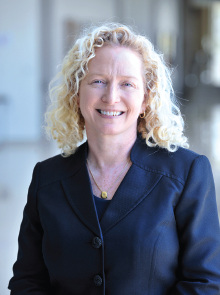Residency/Early Career Sessions Get Psychiatrists Off on Right Track
Abstract
A new track at the APA Annual Meeting will provide career tips and leadership skills to trainees and newly minted psychiatrists.
APA is launching a new series of Annual Meeting sessions for residents, fellows, and early career psychiatrists to enhance their personal and leadership development and help them steer a course for success right from the beginning.
The goal of the sessions is to foster leadership skills, promote peer engagement, and provide a safe space for discussing developmental concerns.

A boot camp led by Laura Roberts, M.D., M.A., will prepare residents, fellows, and early career academic psychiatrists for leadership positions.
Prime on the schedule is the two-day “Leadership Bootcamp for Residents, Fellows, and Early Career Academic Psychiatrists,” led by Laura Roberts, M.D., M.A., a professor and chair of psychiatry and behavioral sciences at Stanford University School of Medicine.
“There are about a million things we wish someone had taught us, told us, or at least hinted at when we first assumed leadership roles,” said Roberts. “But traditional medical training does not always prepare us for leading teams, giving feedback, negotiating with department chairs, networking, or a number of other things that we do every day in academic medicine.”
To remedy that, Roberts and others will impart some hard-earned wisdom in Atlanta to their newest colleagues.
Over several sessions each day, participants will analyze the notion of leadership and learn about the skills they need to succeed in their clinical and educational roles. Training others goes beyond the didactic, so attendees will study ways of tactfully offering comments and suggestions to newer residents, even when that requires difficult conversations.
The second day’s session will use role playing to hone negotiating skills to balance their own professional needs with those of colleagues, subordinates, and supervisors, demonstrating models for effective teaching while helping attendees create a plan for their own growth as leaders in academic medicine. She will also lead discussions on maintaining vocational self-care and balancing one’s personal and professional lives.
These workshops will be conducted in a more open format than those in previous years. Attendees can take the full two-day program or drop in on only the sessions that interest them the most.
The “Forum for Rising and Current Chief Residents” will give those leaders the opportunity to talk with their peers about the challenges and experiences of a role that brings with it major responsibilities.
“Tips for Your First Job out of Residency and Marketing Yourself and Finding Opportunities in Your Early Career” can help newly minted psychiatrists get their careers on a solid footing by finding and choosing among the professional choices that come their way.
“Managing Personal Finance and Student Loans” offers strategies to manage personal finances, repay student loans, and otherwise make informed financial decisions.
For those ready to take the longer view, “Organized Medicine and Your Career” provides a chance to hear psychiatrists who have served in leadership roles in APA and other medical groups to learn the best ways to get involved with organized medicine and advance one’s career.
Finally, the session “Ethical Debates in Psychiatry” will explore complex clinical and other controversies within the field to prepare psychiatrists to tackle the inevitable questions the future will bring.
Residents are not required to register for the Resident Leadership Track. Program materials will be provided free to all participants. ■
More information on the Resident Leadership Track and the session schedule can be accessed here.



